Exclusive: Shanchuan Robotics sues Ecovacs, uncovering the truth behind the patent dispute
![]() 09/30 2024
09/30 2024
![]() 460
460
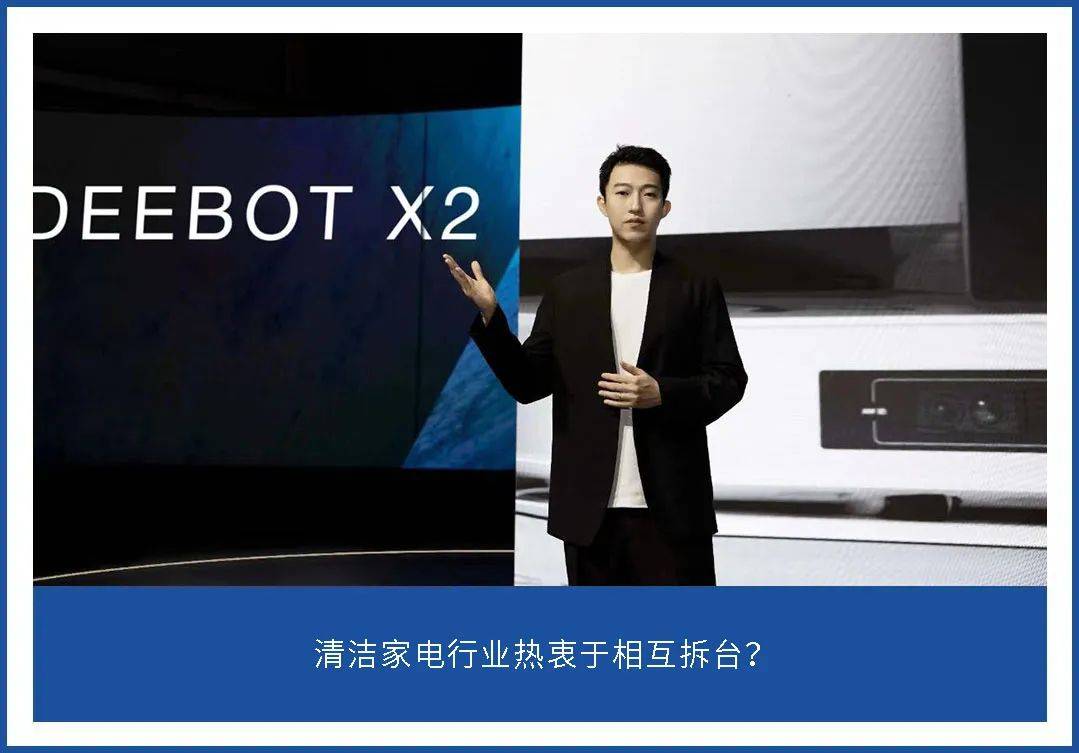
Written by Leon
Edited by Hou Yu
In his book "Competitive Strategy," Michael Porter categorizes competition into two types: one where companies produce, sell, and provide similar products or services in the same manner, all striving to be the best; the other where companies differentiate themselves by producing, selling, and offering unique products or services tailored to their respective strengths.
However, the competition to 'be the best' has become increasingly difficult, turning into a zero-sum game with no clear winners. This has compelled companies to shift towards competing on the basis of 'unique features.' In this process, creative similarities are common, leading to frequent patent battles within the industry. Currently, the cleaning appliance market finds itself in this stage.
Recently, Shenzhen Shanchuan Robotics Co., Ltd. (hereinafter referred to as Shanchuan Robotics) issued a statement claiming that Ecovacs' new product, Deebot X8 Pro Plus, falsely advertised itself as the 'World's First Constant Pressure Live Water Floor Cleaning Robot' during its launch campaign. Shanchuan Robotics pointed out that its 3i brand had already introduced products with live water floor cleaning functionality in October 2022 and has filed a lawsuit in court, demanding that Ecovacs remove the relevant promotional content.
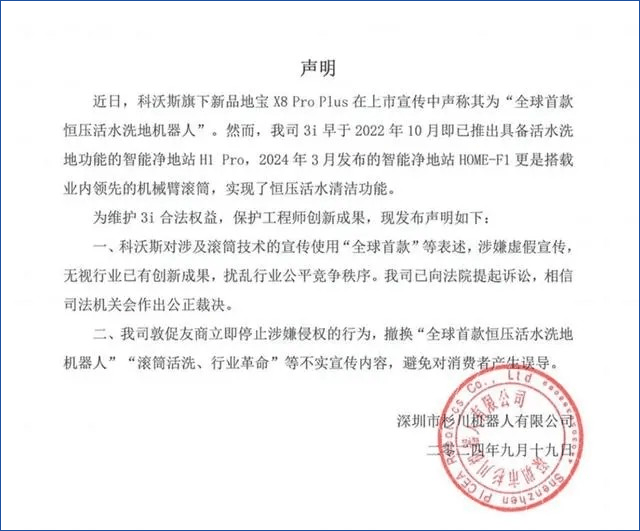
Subsequently, Ecovacs held a media briefing to respond forcefully, outlining its stance as follows:
1. Shanchuan Robotics' lawsuit has not been accepted and is deemed as a 'small brand's bump-and-run marketing tactic.'
2. Ecovacs' live water floor cleaning solution is genuine, and the company holds patents related to constant pressure live water floor cleaning. The floor cleaning robot was invented by its subsidiary Tineco.
3. Ecovacs has taken legal action to safeguard its legitimate rights and interests. It has filed a lawsuit against Shanchuan Robotics in the Suzhou Industrial Park Court for alleged commercial defamation, demanding that the latter immediately cease the wrongful acts, apologize, and compensate Ecovacs for damages amounting to 500,000 yuan. Ecovacs will promptly disclose the progress of this case to the media within the scope permitted by law.
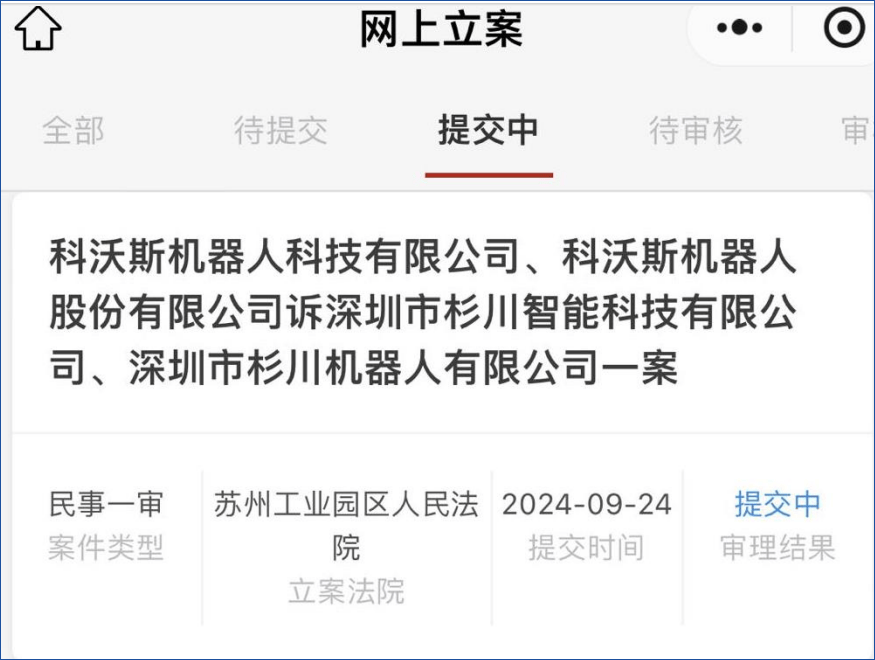
Currently, the focus of the dispute has expanded beyond false advertising to encompass intellectual property disputes.
In the cleaning appliance market, Ecovacs is one of the leading players. According to AVC Revo, Ecovacs holds a substantial share of 21.67% offline and 63.07% online in the Chinese robot vacuum cleaner market, with top-tier product lines and a substantial number of patents.
In contrast, Shanchuan Robotics' 3i brand enjoys relatively low market recognition, with a domestic offline and online market share of 0.14% and 0.08%, respectively. According to Liu Buchen, a home appliance industry analyst, a comprehensive analysis of the information released by both parties suggests that Ecovacs holds a significant advantage over Shanchuan Robotics in the field of floor cleaning technology. Consequently, a plausible hypothesis is that Shanchuan Robotics may be engaging in technical 'bump-and-run' tactics, aiming to boost brand and product recognition through event marketing. However, this remains a conjecture and not an absolute conclusion.
As the dispute escalates, with both parties adhering to their respective stances, the question remains: who truly is the 'World's First'—3i or Ecovacs?
The Battle for the 'World's First Live Water Cleaning' Title
Let's first compare the technical specifications of the two products by referencing their official websites and e-commerce product pages.
The 3i model boasts features such as '3i's Self-Invented Roller Live Water Cleaning' and 'World's First Water-Free Smart Cleaning Station.' The product page notes that the 'World's First Water Circulation Cleaning System' confirmation is based on Frost & Sullivan's research comparing the application of water circulation technology in robot vacuum cleaners. Relevant invention and utility model patent numbers are also listed.
The 'live water floor cleaning' feature of the 3i model encompasses two aspects: a roller integrated within the robot vacuum cleaner, which sprays water through twelve holes for cleaning; and a heating element in the docking station, which evaporates dirty water for recycling.
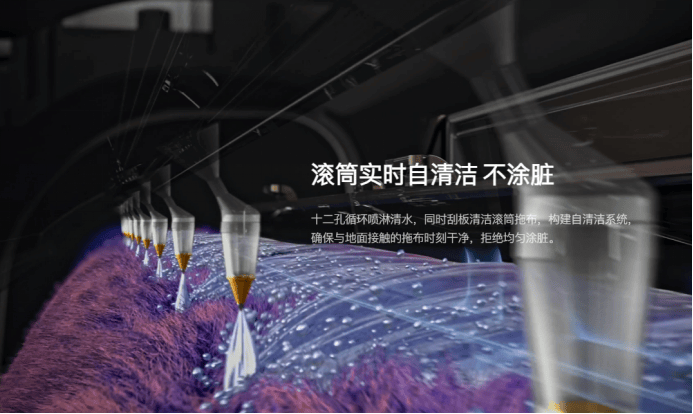
3i's Explanation of Live Water Floor Cleaning

On the other hand, Ecovacs also employs a side-mounted retractable roller for floor cleaning, supporting a 16-hole spray system. The so-called 'constant pressure' feature is embodied in the sewage scraper. On its e-commerce page, Ecovacs indeed uses the promotional slogan 'World's First Constant Pressure Live Water Floor Cleaning Robot,' accompanied by a footnote explaining that this refers to the X8 series, which is the first to introduce 'constant pressure' and 'live water' cleaning functions across all Ecovacs products globally. This description is based on Ecovacs' internal product innovation rather than a comparison with all similar products in the market.
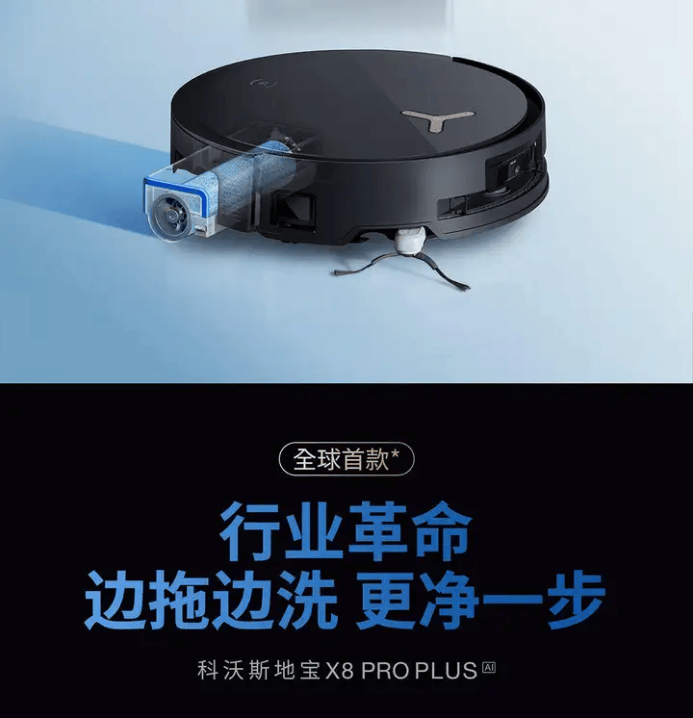
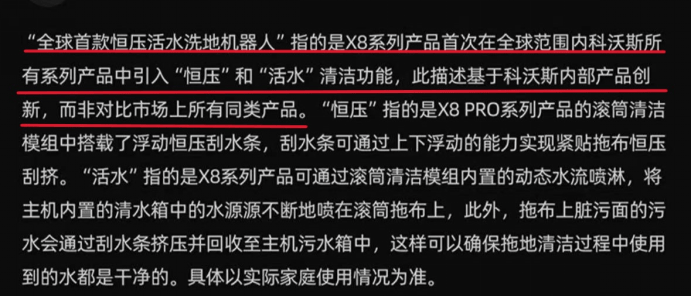
Wu Zexiao, CEO of 3i, believes that Ecovacs fails to provide a detailed explanation on its 'World's First' promotional banner but instead uses asterisks and places the explanation at the end of the product details page, which is difficult for average users to notice. Moreover, Ecovacs' promotions on platforms like Weibo and Red did not include these explanations.
Next, let's delve into the patent applications related to 'live water floor cleaning' by both companies.
Wall Street Tech Eye searched the relevant patents of both companies on the official website of the National Intellectual Property Administration (CNIPA). Shanchuan Robotics holds an invention patent titled 'Base Station and Cleaning Device with the Same' (Publication Number: CN115413982A), filed on September 20, 2022. This patent primarily describes the function of a heating base to achieve sewage evaporation and reuse.

Image: Shanchuan Robotics' Base Station Invention Patent
Furthermore, Shanchuan Robotics has also applied for a utility model patent (Application Number: CN218684159U) describing a real-time self-cleaning system for rollers, filed on October 8, 2022.
According to Ecovacs, its live water floor cleaning invention patent was filed under the Tineco brand in 2022. A search on the CNIPA website revealed as many as 156 invention patents related to cleaning filed by Tineco (Ecovacs) in 2022 and prior years (note: direct searches using keywords like 'constant pressure live water' yielded no results).

Image: Tineco (Ecovacs) Related Patents
Among them, Tineco's invention patent 'Cleaning Device and Cleaning Component' (Publication Number: CN114631758A), filed on March 20, 2022, describes a cleaning function similar to that of the X8 series.
At this point, two conclusions can be drawn: firstly, Tineco (Ecovacs) was the first to file an invention patent for a roller-based live water floor cleaning machine; secondly, Shanchuan Robotics' invention patent is limited to the base station cleaning system, while the floor cleaning machine portion is covered by a utility model patent.
It is worth noting that China's Patent Law defines an 'invention' as a new technical solution proposed for a product, process, or their improvement, while a 'utility model' refers to a new technical solution that is suitable for practical application and is proposed for the shape, structure, or their combination of a product. Generally speaking, invention patents are considered more valuable than utility model patents.
Therefore, in its announcement, Shanchuan Robotics only initiated a lawsuit against Ecovacs for 'false advertising' without mentioning 'infringement of related patents,' merely accusing Ecovacs of 'suspected infringement.'
Regarding this matter, a lawyer told the media that Article 4 of China's Advertisement Law stipulates that advertisements must not contain false or misleading content, deceive or mislead consumers, and that advertisers must be responsible for the authenticity of the content. In this case, if Ecovacs' advertisement claims to be the 'World's First' when other companies have already launched products with similar functionalities, and Ecovacs cannot prove that it was indeed the first globally, this constitutes false advertising.
The lawyer further analyzed that the Advertisement Law requires truthful and accurate advertising language. Therefore, Ecovacs' statement that 'this description is based on Ecovacs' internal product innovation rather than a comparison with all similar products in the market' is questionable. If Ecovacs does not use explicit phrasing like 'Ecovacs' First' in its advertisements and fails to clearly specify the scope, it may still be considered misleading advertising.
Constant Bickering Among Cleaning Appliance Companies
This dispute over the 'World's First' title is but the tip of the iceberg in the bickering among cleaning appliance companies. In fact, Ecovacs has also previously accused its competitors of plagiarism, though this time the roles have been reversed.
Back in August 2023 during Ecovacs' press conference, CEO Qian Cheng vehemently criticized the plagiarism in the robot vacuum cleaner industry, stating, 'Products obtained through plagiarism can only mimic the appearance but cannot replicate the user experience. We admire the product innovations brought forth by our outstanding peers, but we must resolutely resist blatant plagiarism, patent infringement, and safeguard our rights through legal means.'
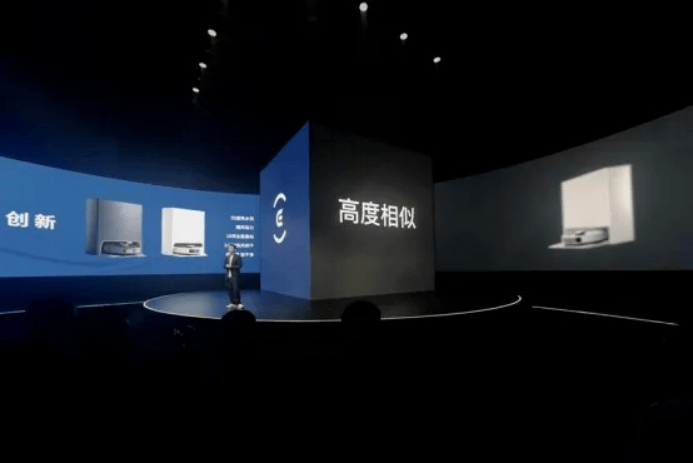
At that time, Qian Cheng had been at the helm of Ecovacs for over five years. As the market matured and competitors flocked in, Ecovacs faced challenges in its performance, with net profits declining for two consecutive years. In the capital market, Ecovacs' market value, which once approached 150 billion yuan as the 'first stock of robot vacuum cleaners,' fell back to 26.6 billion yuan. Qian Cheng's public criticism of competitors was widely seen as a result of intensified industry competition. (For details, see: Ecovacs' Market Value Plummets by 120 Billion Yuan Under Second-Generation Leadership; Time for a Change?)
According to Qichacha, Ecovacs Robotics Co., Ltd. has initiated as many as 12 lawsuits as the plaintiff for trademark infringement, including one against Dreame (which was later withdrawn). Meanwhile, Ecovacs has also been sued by Dreame as the defendant in multiple civil disputes, including trademark infringement, unfair competition, and infringement of invention patents, all of which are currently pending in the first instance of civil litigation.
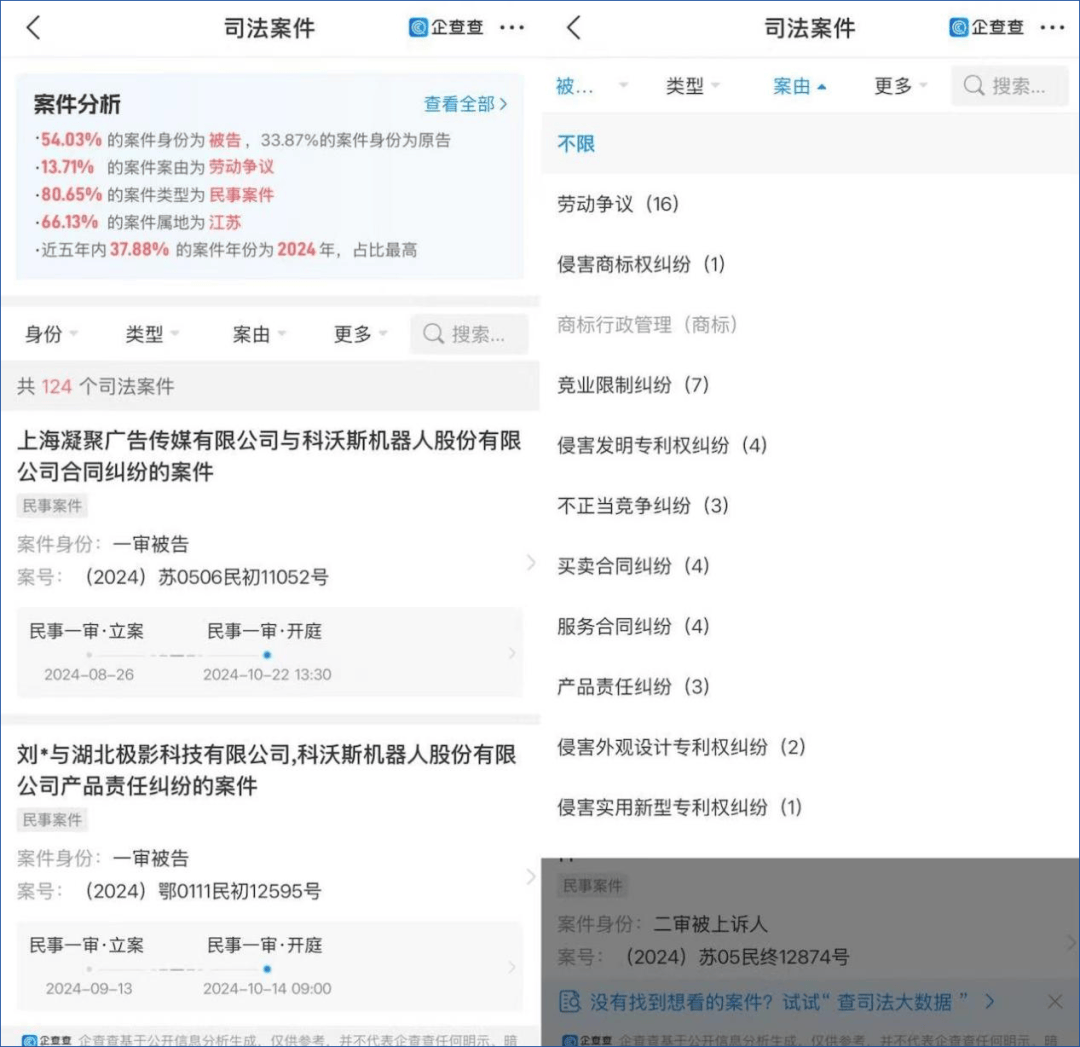
Image: Legal Cases Involving Ecovacs
Shanchuan Robotics, the entity behind the 3i brand, has been a defendant in 13 civil cases and 1 execution case, primarily involving disputes over non-compete agreements, sales contracts, labor contracts, and wage claims. There have been no patent infringement disputes. As a plaintiff, Shanchuan Robotics once sued Beijing Roborock Technology Co., Ltd. for infringement of invention patents but later withdrew the lawsuit. (For details, see: Frequent Share Sales by Key Shareholders Cast Doubt; Roborock's Growth Myth Shattered)
A cursory search of pending legal cases involving cleaning appliance companies reveals a pattern: leading players like Ecovacs (Tineco), Dreame, Roborock, and NARWAL almost all have ongoing civil lawsuits against each other, primarily focused on infringement of invention patents, utility model patents, and unfair competition. Many of these cases are still pending.
Just before this year's 6.18 shopping festival, Roborock received a court injunction from Dreame, resulting in the temporary removal of relevant products, leading to a loss of at least 20,000 sales during the promotional period. Roborock then filed a petition for reconsideration with the Supreme People's Court, which lifted the injunction a month later. (For details, see: Frequent Share Sales by Key Shareholders Cast Doubt; Roborock's Growth Myth Shattered)
Whether it's patent disputes or public bickering, they both underscore the anxiety of cleaning appliance companies. At the same time, they also indicate that technological innovation in cleaning appliances has reached a bottleneck.
Innovation is Difficult, and Patents Tend to be Homogenized
After years of development, cleaning appliances, particularly robot vacuum cleaners, have entered a mature stage, with highly similar design concepts, product forms, and functionalities, leading to an innovation bottleneck. One statistic illustrates this point: starting in 2015, the number of patent applications in the global robot vacuum cleaner industry began to rise, peaking in 2020 before plunging by a staggering 75% year-on-year in 2021.
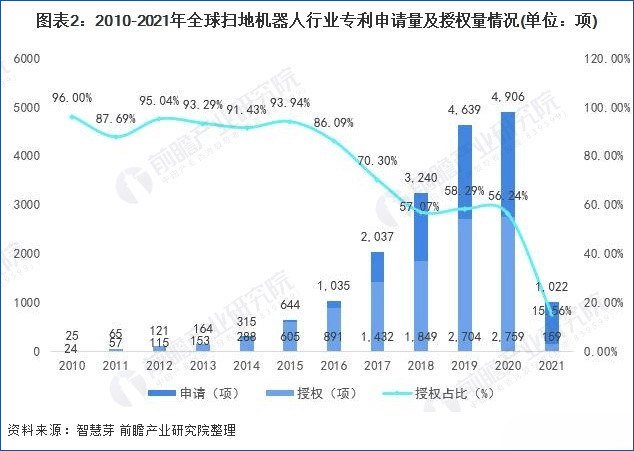
At the same time, it is undeniable that patents tend to be homogenized. In the era of robot vacuum cleaners, most patents focused on laser navigation, obstacle avoidance, and AI algorithms. With the advent of the floor cleaning robot sub-category, water tank design and self-cleaning technology have become key areas, attracting numerous companies to apply for similar patents.
Taking Ecovacs as an example, its 2024 interim report shows that as of the end of the reporting period, the company had a total of 1,414 patent applications pending, including 1,145 invention patents (including 86 overseas invention patents). Among these, 308 were related to software algorithms, and 60 were related to sensor solutions. During the reporting period, the company filed 122 new patent applications, including 57 invention patents.
Furthermore, as of the end of the reporting period, the company had obtained a total of 2,242 authorized patents, including 661 invention patents (including 132 overseas invention patents). Among the invention patents, 189 were related to software algorithms, and 41 were related to sensor solutions.
From the scale of patent applications and the number of patents obtained, Ecovacs remains a frontrunner in the cleaning appliance industry. However, invention patents, considered the most valuable, account for approximately 29.48% of the total, with the remainder being utility model and design patents. While this ratio is not low in the cleaning appliance market, it may pale in comparison to the broader technology industry. The 3i incident also underscores that even Ecovacs struggles to establish a solid technological barrier.
This phenomenon is also reflected in the market. In the first half of 2024, the cleaning appliance market showed signs of recovery, with sales in the Chinese market reaching 12.41 million units, up 13.6% year-on-year. Analysts at the China Commerce and Trade Institute predict that sales of cleaning appliances in China are expected to reach 26.81 million units in 2024, up 6% year-on-year.
In the first half of the year, Ecovacs achieved revenue of RMB 6.976 billion, a year-on-year decrease of 2.35%; net profit was RMB 609 million, a year-on-year increase of 4.26%. Despite the decrease in revenue and slight increase in profit, Ecovacs' R&D expenses reached RMB 460 million, a year-on-year increase of 14.22%, accounting for 6.4% of revenue, indicating a clear intention to strengthen technological barriers.
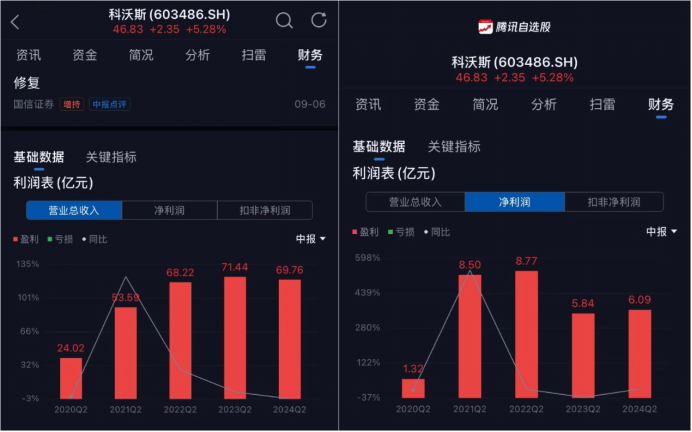
Similarly, another leading cleaning appliance company, Roborock, spent RMB 410 million on R&D in the first half of the year, a year-on-year increase of 42.92%, accounting for 9.28% of revenue.
However, despite the time and effort invested in R&D by leading companies, users do not perceive significant differences in similar technologies, which cannot effectively translate into actual purchasing power. Meanwhile, small brands like 3i can easily break through so-called technological barriers, launch similar products, and compete with leading companies in marketing, sales, and other aspects.
At present, time seems to be the only solution. According to AVC Revo, the floor cleaning robot industry continued to undergo reshuffling and intense competition with price wars in the first half of this year. On the positive side, the number of monthly brand sales has dropped to less than 100, with many long-tail brands being eliminated and the market further concentrating on mainstream brands.
AVC Revo believes that while the overall growth of the cleaning appliance market was good in the first half of this year, considering last year's trend and the current industry situation, it remains challenging with insufficient innovation and in need of improvement. For companies, it is necessary to provide practical solutions to user pain points, such as hair tangling and hot water mop washing. The further integration of sweeping and floor-cleaning robots is also a major trend, and advanced features such as AI models need to be further implemented to truly improve obstacle avoidance and route planning experiences.








